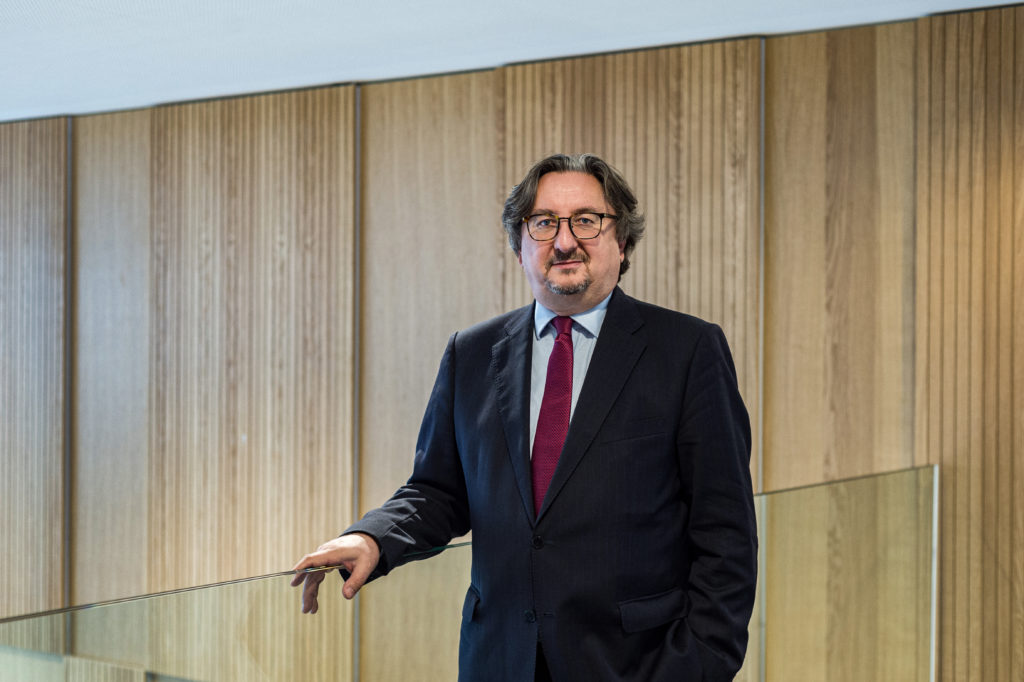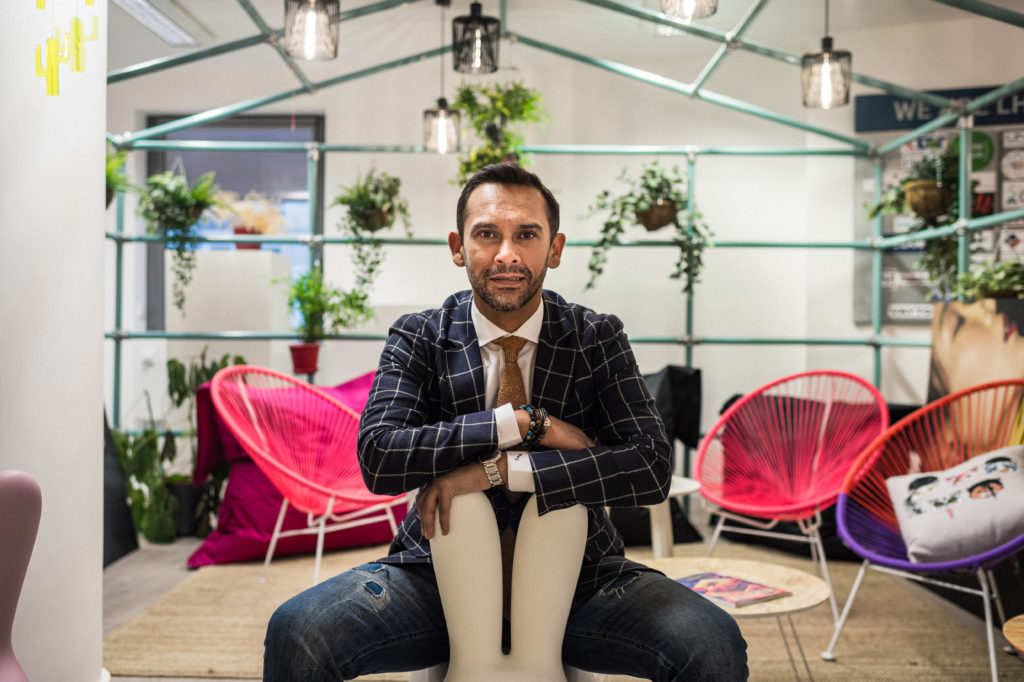Nasir Zubairi, CEO of the LHoFT, Jean Diederich, Partner at Wavestone and Bartek Swatko, CEO of Mercedes Pay S.A., have a unique sector vantage point at the helm of their respective organisations. Leo asked them to share their views on the European payments landscape and to look into the crystal ball…
AN ESTABLISHED SECTOR?
“Fintechs are no longer made of start-ups and small companies, the sector has grown up.They are now seasoned, professionally managed companies with broad operational capabilities and are a fundamental part of our economy and society,” says Bartek Swatko, the Polish CEO of Mercedes pay from their Kirchberg office.
“In the past, payments have been seen as a critical enabler for growing economies and to boost sales. Today, payments go beyond a smooth and invisible transaction between omnichannels. They enable additional services such as identity, loyalty and commerce. Fintechs are often seen as a disruptive technology… But they do not necessarily always disrupt, they simply solve problems.”
He believes that being ‘agile’ makes fundamental sense when it can deliver a fast- er and better service and that future transformation will be boosted by the overall fusion of banks and Fintechs: “Payments as a standalone have reached saturation point… and this is not because of banks. Historically, a payment was one of the main competencies of a bank. These days payments giants offer instalments, financial products, rewards or other services. It is centred around convenience and the effective use of data and its monetisation.”
Jean Diederich is a Partner at Wavestone supporting companies and organisations in delivering transformations through management and digital consulting. He shares his pragmatic perspective: “There are too many players overall in the ecosystem, and too many are failing. E-commerce integrating e-payments were the big winners, they have grown the number of transactions tremendously, partnering with big players in order to make the experience smoother.What we see today are international cross-border, compliant, payment instruments to help payments grow. The option to enjoy EU single market access through the European Passport brought with it hype from a regulatory perspective. But it is limited. The sector has not quite reached maturity yet, as it is still ironing out some legacy issues… the future of payments will evolve as the technology will be more linked in a chain of business steps.” The question remains whether innovation alone can help to overcome these obstacles.
Nasir Zubairi, the CEO of Luxembourg House of Financial Technology (LHoFT), is optimistic about the road ahead noting that “Luxembourg is similar to a growth company in many ways, with close knit collaboration and accessibility of senior decision makers across both the private and public sector. Although Europe is innovating more slowly than most, Luxembourg has a lot of agility to be able to leverage innovation. Given its unique European location, business acumen for cross-border business and its role in servicing a European and increasingly global customer base, Luxembourg makes sense as a core hub for payment firms like Alipay, Amazon and Rakuten to deliver unified payments services across the EU.”

Jean Diederich

The sector has not quite reached maturity yet, as it is still ironing out some legacy issues... the future of payments will evolve as the technology will be more linked in a chain of business steps.
SCOPE FOR GROWTH
Bartek Swatko shares the LHoFT CEO’s view that “Luxembourg is reminiscent of a Fintech in itself” and that industry potential is within reach through openness, effective governance, infrastructure and talent. More broadly, he notes that the ability to thrive in a future context is about more than just adaptability, “it’s about being able to anticipate what comes next. I trust that Luxembourg will be successful with all these characteristics. It is not just about attracting the locals; its openness to other markets and international partnerships is key. If you are small you have to think big.” He describes his interaction with the regulator as parallel to his broader experience of Luxembourg: “They approach things with an open mind and a willingness to engage in a dialogue. This is a great enabler for not only future business to grow, but for the country to grow.”
Diederich believes that Luxembourg is already performing well when it comes to regulation and legislation, due to “a trans-European and multicultural set up of financial functions. If it is private banking, the fund industry or e-commerce payments… there is a lot that we can do, and we have a strong role to play.” He recalls that Luxembourg was a first mover with the Single European Payments Area (SEPA).
Regardless of Payment Services Directive 2 (PSD2) allowing “room for interpretation”, Swatko is confident that regulation is heading in the right direction, with the purpose of providing more choice, even if initial experience of Secure Customer Authentication (SCA) does not provide choice for the customer: “What happens in Luxembourg is a good reflection of what happens in Europe overall.”
Zubairi thinks that PSD2 will yet be exploited more by the big techs than it will be by the start-ups, fearing that this will only give the big five of Google, Amazon, Facebook, Apple and Microsoft (GA- FAM) even more consolidated power to make decisions and money from data: “There don’t appear to be controls on them, only controls on the banks….”. Jean Diederich is a proponent of Payment Services Directive 3 (PSD3) to consolidate between directives or regulations which are not homogeneous, stressing that this is particularly important when thinking about data protection or GDPR, and that: “legal certainty will be a huge boost to future digital thinking.”
Within the regulatory and broader context, Zubairi concludes that “Luxembourg is a hub to house the European headquarters of subsidiaries, where you can expand, access Europe and the world thanks to its connectivity. We have credibility and ability in the payments space and the Chinese and Americans have already realised this. This is set to continue.”

Bartek Swatko

We need to focus on the new generations, as they don’t know the world without a smartphone or GAFAM.This shift influences the way we create, offer and operate our services.
AGE OF THE CONSUMER
The next stage of payment sector development is often said to be driven by behaviours and expectations as they evolve, dictated by our technology environment. Zubairi sees the “world as trending towards a place where payments should become invisible, with less friction overall and more harmonisation on a global scale. There is always a tussle between usability and security, hence the constant arms race to ensure that payments become more sophisticated.”
Some countries are further ahead than others, “the US for example is still using cheques and signatures. While peer-to-peer payments have taken off massively in the US, Germany is still a largely cash-based society. These are all shaped by cultural attitudes.” He points out that the Alibaba-owned Yu’e Bao (meaning leftover treasure) fund is the biggest mutual fund on the planet based upon the spare change in your pocket, “Asia has innovated significantly faster than Europe and is now here; Alipay has amassed the marketing clout and resources to build a big presence.” This will be a significant factor to watch on the horizon.
Bartek Swatko envisions that cultural attitudes and a growing awareness of diversity are an opportunity: “As a small team we speak 16 languages and come from 14 countries. This doesn’t necessarily make us stronger as a team, but it does make us more sensitive to different perceptions and our different customer nations.We are big believers in diversity and inclusion advocating re-spect and sensitivity for different viewpoints and respective backgrounds. The Passporting process in itself defines our European borders.”
Jean Diedrich sees a sophisticated user experience as critical to achieving potential maturity in the digital space. This is said to be closely tied to the younger generations, with millennials frequently cited as trendsetters on the global consumption stage. Bartek Swatko jokingly warns that we need to begin to look into newer demo- graphics because “Millenials are already getting old! On average the composition of our society is getting younger and younger. We need to focus on the new generations, as they don’t know the world without a smart- phone or GAFAM. This shift influences the way we create, offer and operate our services.”
However, Nasir Zubairi still considers the millennial segment as representing a “massive opportunity to new market entrants, but you need to get them early.” He believes that banks have been successful at getting younger consumers on board and to locking them in (metaphorically), but he sees scope for innovation within gaming platforms on the horizon: “I’m surprised that nobody has explored the potential of PS4, Xbox, or the related gaming platforms such as Steam and the chat application Discord. Payments and accounts are there already and this could move into cards, mobile payments, to loans, insurance… it would help to lock-in a new generation to these channels, growing with them as the core of their financial services.” He adds wryly, “It would get many a boy anyway!”
He challenges the view that innovation is just about creating something new, “it’s something new which adds value. If it adds value, then people will start using it and that will hopefully continue to drive the industry and the market forward to catch up with the rest of the world in terms of innovation”. Another market segment where he hopes new market entrants will drive potential innovation, is B2B payments (specifically money remittances), where there is scope to enhance the user experience.
Each of our LEO interviewees agreed that trust takes a long time to build in the age of the consumer, and takes a fraction of that time to break. Banks have been perceived as stalwarts in this regard, “no matter how inefficient or frustrating” according to Zubairi. “I came to the conclusion some years ago that it doesn’t make sense to compete with traditional institutions, because it’s very hard to build the key element of customer trust. We trust financial institutions to control our money and I feel it is a good strategy to work with them as a payment provider, rather than against them, to facilitate transactions.”
While the consumer may be in the driving seat, Jean Diederich talks about the fine balancing act between legal, compliance, tech development and between digitalisation supply and demand to fully develop the right competences to deliver a digital nation: “Luxembourgers are very much pushing digitalisation and are strong consumers in this regard. Banks have woken up and are into digitalisation too, meaning that it is getting more competitive for Fintechs and Neobanks. It will be interesting to see how this dynamic plays out in the future.”

I’m surprised that nobody has explored the potential of PS4, Xbox, or the related gaming platforms such as Steam and the chat application Discord. Payments and accounts are there already and this could move into cards, mobile payments, to loans, insurance... it would help to lock-in a new generation...

Nasir Zubairi
THRIVING IN PARTNERSHIP
When Open Banking arrived with a fan- fare in 2016, the view from the experts was that this represented a big and bold future. A couple of years on, the perception remains. Swatko notes that “Open Banking is not a threat to market share, it may well be an opportunity to boost collaboration between Banks, Fintechs and financial institutions. Through better use, exchange and monetisation of data this ultimately improves a product or service.”
At Mercedes pay they are open to partnerships, particularly if that means that they can deliver a better service and thrive on the market. Payments are no longer just about the bilateral context between merchant and buyer, “payments enable easily redeemable rewards, create loyalty and become a unique differentiator between platforms.”
Will partnerships replace agility, collaboration, or ‘coopetition’ as the new buzzword? Jean Diederich notes that “al- though these are doubtless central concepts, new buzzwords are taking shape on the horizon.” He foresees a future of “‘24/7’, and of sector consolidation of everything that is instant taking place. Banks and financial institutions are now organising themselves to operate on this basis and shift the prior mindset.”
Nasir Zubairi believes that the notion of coopetition or ‘mutualisation’ makes a lot of sense, particularly around the areas of regulation and infrastructure: “In a world where banks have to be lean and mean in order to maintain healthy KPIs, you need to look at what is and what isn’t a source of competitive advantage. Sharing the cost of certain infrastructure for efficiency makes a lot of sense… i.e. why isn’t there one back office that all banks use? The banks have very sensibly pursued a mutualisation strategy in Luxembourg with the likes of LUXHUB, Finologee and Digicash… I think the trend will continue because it’s better to share the cost at a time where banks are having to downscale budgets to maintain margin, yet still need to be innovative and create new infrastructure.”
Standardisation forms part of the fundamentals, and with future promise from ‘APIsation’ and Open Banking, Diederich predicts that we will see a lot of cross-collaboration on many additional financial products that offer consumers more choice beyond the basic Neobank packages, i.e. mortgages, savings, car loans: “A frictionless user experience is an opportunity to win and retain client business – whether they be traditional banks, Fintechs or Neobanks – and there is a lot of added value to be had from working with partners.”

